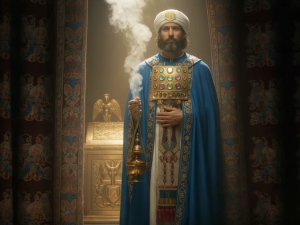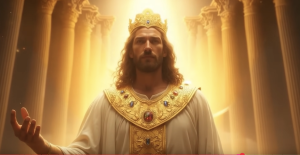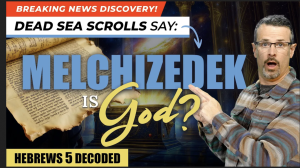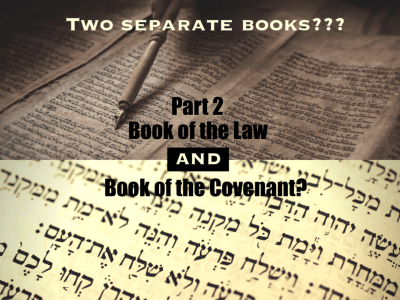Decoding Hebrews – Chapter 5
Who exactly is Melchizedek and how does he fit into prophecy?
 The High Priesthood of Christ and the Order of Melchizedek
The High Priesthood of Christ and the Order of Melchizedek
The book of Hebrews presents Christ as the ultimate High Priest, drawing deeply from Jewish scripture and tradition. Modern Judaism often rejects the idea that a divine figure could hold the priesthood, yet evidence from the Dead Sea Scrolls shows that first-century Jews anticipated a heavenly priestly figure—Melchizedek—who was linked with God Himself.
Review of Hebrews 4
Hebrews 4:15–16 declares:
“For we do not have a high priest who cannot sympathize with our weakness, but was in all points tempted as we are, yet without sin. Let us therefore come boldly to the throne of grace, that we may obtain mercy and find grace to help in time of need.”
The “throne of grace” refers to the Holy of Holies and the mercy seat upon the Ark of the Covenant. The author of Hebrews emphasizes that through Christ, believers approach God directly, contrasting with the flawed Levitical high priesthood, which required continual sacrifices (Leviticus 16:6).
The Flawed Earthly Priesthood
Hebrews 5:1–3 explains that every high priest is chosen from among men, must offer sacrifices for sins, and is himself subject to weakness. The Levitical priesthood, while divinely instituted, was limited because of human frailty. Rabbinic tradition and the Talmud recognized this problem, noting the high priest’s vulnerability even during Yom Kippur. The Essenes of Qumran withdrew from Temple Judaism altogether, rejecting its politicized priesthood.
Christ in the Order of Melchizedek
Hebrews 5:5–6 cites Psalm 2:7 and Psalm 110:4:
“You are My Son, today I have begotten You… You are a priest  forever according to the order of Melchizedek.”
forever according to the order of Melchizedek.”
Melchizedek—meaning “my king is righteous”—was both king and priest (Genesis 14:18–20). His priesthood predates and supersedes the Levitical order. Psalm 110 prophesies a messianic figure from Judah who would embody both kingship and priesthood.
The Dead Sea Scrolls and Melchizedek
The Qumran text 11Q13 interprets Isaiah 61:1 and Psalm 82:1, portraying Melchizedek as a divine agent who:
- proclaims liberty,
- forgives sins,
- executes judgment,
- defeats Belial (Satan), and
- brings salvation (Isaiah 52:7; Daniel 9:25)
This strikingly parallels the New Testament depiction of Christ. At Qumran, Melchizedek was equated with Elohim, anticipated as a heavenly priestly deliverer. Hebrews builds directly upon this Jewish expectation.
Non-Levitical Priests in Scripture
Several figures served in priestly roles outside Levi:
- Noah (Genesis 8:20),
- Abraham (Genesis 12:7–8; 22:13),
- Jacob (Genesis 35:1,7),
- Job (Job 1:5),
- Jethro (Exodus 2:16; 18:1),
- Samuel (1 Samuel 7:9),
- David (2 Samuel 6:13–18),
- Solomon (1 Kings 8:62–64),
- Elijah (1 Kings 18:30–38).
This pattern makes Psalm 110’s union of Judah’s kingship with eternal priesthood entirely natural to a Jewish reader.
Christ’s Qualification as High Priest
Hebrews 5:7–9 recalls Christ’s prayers and suffering in Gethsemane. His priesthood was not temple-based but rooted in obedience, prayer, and sacrifice. The Greek word translated “perfected” in verse 9 means “fully qualified” or “consecrated” (cf. Leviticus 8:33). Thus, Christ was not “made sinless” but proven fit as the eternal High Priest.
Hebrews 5:10 confirms His divine appointment:
“Called by God as High Priest according to the order of Melchizedek.”
Milk or Solid Food?
The chapter closes with a rebuke (Hebrews 5:12–14): many believers remain on “milk,” unskilled in God’s word, unable to discern good from evil. True maturity requires grasping the depth of the Melchizedek priesthood within the Torah, Psalms, and Prophets.
Conclusion: Love as the Fulfillment
Understanding Christ’s priesthood is not merely intellectual—it shapes how we live. 1 John 3:4 defines sin as “the transgression of the law.” Without God’s law, there is no sin, no curse, and no need for a savior. Yet love is the heart of the law (Matthew 22:37–39).
The priesthood of Christ, anticipated in the Torah and revealed in Hebrews, invites believers into maturity, discernment, and love—the true mark of God’s people.
Watch full teaching here:
https://www.youtube.com/watch?v=fhhlsfCMidA












